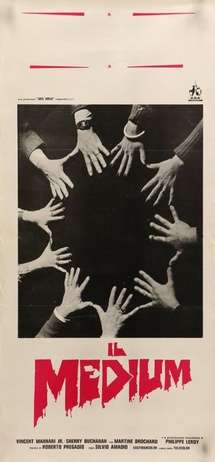Il medium
Il medium (transl. The Medium) is a 1980 Italian film directed by Silvio Amadio.
| Il medium | |
|---|---|
 | |
| Directed by | Silvio Amadio |
| Screenplay by |
|
| Story by | Silvio Amadio[1] |
| Starring |
|
| Music by | Roberto Pregadio[1] |
| Cinematography | Maurizio Salvatore[1] |
| Edited by | Silvio Amadio[1] |
Production company | Ars Nova Cooperativa S.r.l.[2] |
Release date |
|
Running time | 89 minutes[1] |
| Country | Italy[2] |
Production
Il medium was developed due to director Silvio Amadio's interest in the occult, which he learned through his friend Demofilo Fidani.[2] Fidani was a filmmaker who prominently worked on low budget Italian Westerns, and by the 1980s had become more known for his work in esoterism, including writing some novels on the subject.[2] Amadio and Fidani had discussed their mutual interest in the topic since the 1970s.[2]
Among the screenwriters was Claudio Fragasso, who said he was approached by the director along with a psychic medium who told him that "the dead had told them [he] should write this script."[3] Fragasso also stated that this was the first script he had worked on, even before Meet Him and Die.[2] A film scenario with the same title was in Rome SIAE offices that were dated from October 17, 1975.[2] Filming on Il medium took place much later, starting on May 7, 1979.[2] Among the cast was Martine Brochard, who had little recollection about the making of the film, declaring "I only remember that it all seemed very homemade, and I had a very cold relationship with Amadio. I did my stuff and 'Thanks and goodbye'."[4]
Style
Film historian and critic Roberto Curti stated that despite the film often being labelled a horror film, it was a supernatural drama that involved ghosts, and some such gothic stapes such as a haunted house.[2] Curti noted the film's horrific bits are limited to a dog attack, a burning painting that emits laughter and voices recorded from unknown sources on an audio tape.[5]
Release
Il medium was distributed regionally in Italy on 10 March 1980.[2] The film grossed a total of 15 million Italian lire domestically on its release.[2]
References
Footnotes
- Curti 2019, p. 43.
- Curti 2019, p. 44.
- Berger 1997, p. 57.
- Ippoliti & Norcini 2004, p. 36.
- Curti 2019, p. 45.
Sources
- Berger, Howard (June 1997). "Claudio Fragasso's Gore Wars". Fangoria. No. 163.CS1 maint: ref=harv (link)
- Curti, Roberto (2019). Italian Gothic Horror Films, 1980–1989. McFarland. ISBN 1476672431.CS1 maint: ref=harv (link)
- Ippoliti, Stefano; Norcini, Matteo (2004). "Una favola chiamata cinema. Intervista a Martine Brochard". Cine70 e dintorni. No. 6.